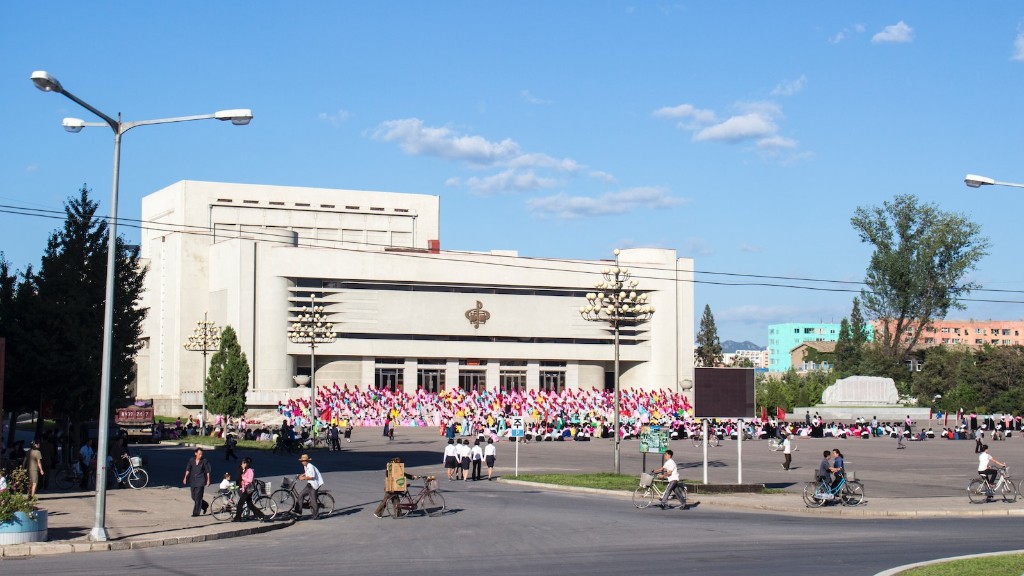Impact of North Korea War
North Korea has been a source of tension and chaos in world politics for many years now. If North Korea were to decide to start a war, the consequences would include catastrophic economic, political and social ramifications. The economic consequences of a war in North Korea would be severe. If the military conflict extended beyond North Korea, the whole region’s economic stability would be compromised. In addition to losses of trade, financial resources and infrastructure, a war could also cause the collapse of markets, the devaluation of currencies and the closure of major trade routes.
The political reverberations of a North Korea war would be extensive. Governments of countries in the region – and possibly further afield – might be destabilised. Displacement of people, conflicts between ethnic and religious groups, leading to civil wars and unrest, would be possible. The United Nations and other supranational organisations would be forced to take a stand on the conflict, as it escalated. This could potentially lead to a greater realignment of global power.
In terms of social consequences, a North Korea war could have far-reaching implications. People in the warzone would be exposed to a heightened risk of disease, stress, malnourishment or even death. Different political and social identities would be irrevocably altered, with particular attention to the North Korean population. In short, a North Korea war would be a human tragedy with potential consequences for the entire region and beyond.
The chances of a North Korea war starting are slim but the possible consequences must not be disregarded. According to political analysts, the most likely biding factor is its desire for attention from the rest of the world. North Korea’s nuclear arsenal, its aggressive attitude and its abundant financial resources are cause for concern. A war in North Korea could quickly become internationalised and it is in the interest of all nations to do whatever it takes to avoid this scenario.
Political Repercussions
If a full-fledged war broke out, its impact would be immense not just in the Korean peninsula, but world wide. In order to restore peace and stability to the region, humanitarian and economic aid would have to be directed to the war-torn areas. This may go some way in mitigating the economic damage, but it would take years to restore all the infrastructure in ruined, vulnerable and disconnected areas.
Politically, the United Nations would be forced to take more drastic action. This could lead to the implementation of an arms embargo or the imposition of economic sanctions. There could be further regional and international tensions, with nations either supporting or opposing the North Korean regime. Such tensions could lead to the formation of new alliances and, ultimately, the reorganisation of the power structures between countries and supra-national organisations.
Military Implications
Since North Korea possesses weapons of mass destruction, the potential for devastating military action is a serious concern. In the event of a North Korea war, civilians would be most vulnerable. Furthermore, there is the additional threat of biological and chemical agents, including those designed to cause large-scale devastation, that could be released and further heighten the instability of the region.
If the war extended beyond North Korea, the militaries of other countries would have to be ready to be deployed and provide support. The use of forces of different countries would bring serious diplomatic issues to the foreground. The deployment of foreign military persons and personnel on North Korean soil would further complicate the situation, and potentially further escalate the conflict.
Public Perception
Public perception plays a crucial role in war, and in the case of North Korea, it could boost the morale and abilities of either side as they enter into a conflict. If the governments of other countries pressure the North Korean regime to focus more on economic progress and open up its domestic market, the population might be energised to stand up against wartime aggression. Conversely, if a war begins, the people of North Korea can be confident that the diplomatic support, financial and military aid, would be strong.
Economic Impact
A war in North Korea would have far-reaching economic implications. The financial markets of nearby countries, such as Japan and South Korea, would be destabilised. Trade routes in East Asia would be affected, resulting in potential losses in imports, exports and investments. Financial assets, such as stock markets and currencies, would suffer. The flow of goods and commodities in the region would cease, and the prices of essential items would skyrocket.
The economic repercussions for North Korea would be particularly devastating. Sanctions, embargoes and trade restrictions would further weaken the already fragile economy. Many jobs and businesses would be lost, and the North Korean government would be further burdened with the costs of a wartime economy.
International Tensions
The possibility of a war in North Korea inevitably brings international tensions to the forefront. With much of the world’s attention focused on the region, major geopolitical powers such as the US, China, Russia and Japan may become involved in the conflict. This could potentially lead to a greater realignment of international power.
In order to avoid an international conflict, it is imperative that all countries in the region exercise restraint and find compromises. The US, in particular, will have to step up its diplomatic effort to ensure that all countries involved opt for peaceful dialogue rather than escalating the conflict.
Humanitarian Considerations
The effects of a North Korea war would be felt across the world, but the most damaging consequences would be for the citizens of the North Korean regime. The humanitarian crisis that would result from such a conflict could be of a magnitude previously unseen in the region. Many of the people living in North Korea already live in poverty and any kind of conflict would further deepen the crisis.
Even if a peace agreement was to be reached, it would take many years for the region to recover from the immense human suffering it would have endured. The North Korean people would need large-scale medical aid, food assistance, rehabilitation and recreational activities in order to return to normal.
Worldwide Implications
The effect of a war in North Korea cannot be underestimated. International tensions and diplomatic exchanges would be high, while the effects on the global economy would be considerable. There would also be a huge humanitarian nightmare to contend with, with millions of civilians at risk of disease, displacement and death.
The lasting impact of a war in North Korea could shape international politics for generations. It would have a profound effect on the security and stability of the region and beyond. With the right diplomatic effort and coordination, the world can hopefully avoid this scenario.


